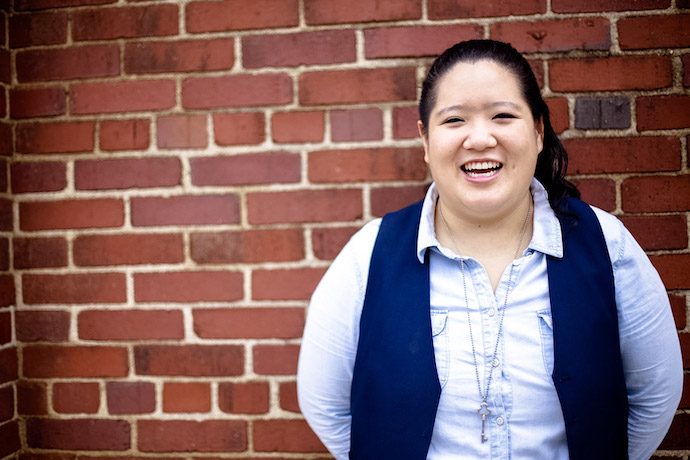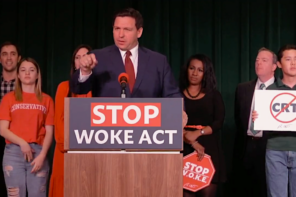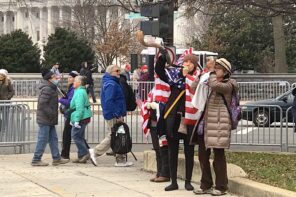It’s been a little over a year since the president first took office, and the role of white evangelical support for Donald Trump remains under the microscope. Last year I wrote a story about the multiplicity of reactions from evangelicals of color, many of whom worship alongside the white believers supporting a president that empowered white nationalists.
In a few decades, people of color will make up the majority of the evangelical movement, according to church growth experts. Much is at stake as this political era throws the relationship between evangelicals of color and white evangelical institutions into question.
In the following Q&A, SueAnn Shiah, an artist and filmmaker who identifies as a queer Taiwanese American evangelical, attempts to square white evangelical support of Donald Trump with her spiritual community, a white church in a conservative Presbyterian denomination in Nashville, Tennessee. I spoke to her at the start of 2017 and at its close. The following is an edited and condensed version of our conversations, which took place over phone and email.
FEBRUARY 2017
Since the election, how has your relationship with white evangelicalism shifted?
Sundays are hard. The last few months, as the temperature has turned up, I just get angry when sermons don’t address the injustice and violence in our country. I do not want to leave the first church that ever felt like a home to me. I’ve spent my entire Christian life pursuing relationships with white and straight people, reaching out, building bridges—after the election I wondered, what good did that do? I’ve decided that I want to stay adjacent to my denomination because of my relationships and connections. I’m going to hang around because I have a prophetic call in this space, but I’ve also realized that if I am going to do this work, I need to receive spiritual and pastoral care from other places.
Where do you find spiritual nourishment these days?
Recently I realized, wow, I’m not being pastored. I’m not being cared for here. Women in general in my denomination do not receive pastoral care, especially if they’re single. Because of our aversion to female leadership, we don’t have women in places to offer pastoral care. So I have been investing deeply in my friendships with people of color, in particularly other queer people of color who are all over the country because that’s the only way I can survive this desert.
***
NOVEMBER 2017
What’s happened since we last spoke?
I stopped attending services in March. I know you wrote about how I walked out of a service. Well, that kept happening. Eventually you realize you’re spending more of Sunday walking out than you are sitting in your seat and it’s time to consider taking a break from church.
Where are you now? Have you left your church completely?
I moved to Michigan. Part of moving was getting away from that community. I think my life was just so deeply intertwined with them that even though I wasn’t attending church anymore, I was still “doing life” with them and I couldn’t completely leave until I just up and moved away.
I’m still a member there officially. I still think of it as “my church.” I think it was just that it was too painful to keep going. There wasn’t a final straw or a moment when I decided I couldn’t take it anymore. The world and my life was a mess; all of it just kept building up and something had to give.
After months of trying to meet with my senior pastor and educate him on racial justice, my sense was that he felt massive white guilt, to the point that it was paralyzing him, leaving him unable to do more than wallow in that guilt. Maybe with the right tools and time, he would be able to learn to confront that guilt, bring it to Jesus, and into action and repentance, but I didn’t have the time to wait around anymore and to be the one who held his hand through it.
Leaving was accepting that my presence couldn’t change things. Or at least the microbial amount I would be able to change wasn’t worth the amount of pain and stress it was costing me personally; and accepting that I will never be able to change things for the better if I’m not healthy—physically, mentally, emotionally and spiritually.
What do you miss?
I miss my church. I miss my friends, but I know this was the right decision.
I think most of all, I miss taking communion. I wept quite a bit during communion at the conference hosted by The Reformation Project conference (a group advocating for the inclusion of LGBTQ people in the church).
I’m in the wilderness. I’m spiritually homeless, and I think I’m embracing that. I think a lot about Exodus—leaving Egypt and wandering in the wilderness. There is no temple to worship, but we have God’s manna at our fingertips, and a cloud to guide us by day and shelter us by night. The presence of God is visible and tangible—it’s comfort ever needed and felt.
Sometimes you find an oasis, like The Reformation Project, but I’m in the wilderness for now, and I’m learning about God’s faithfulness, provision and goodness in new ways.
What could your church have done to keep you?
I don’t really blame my church for the ways things turned out. They just don’t have the tools or resources to even begin divesting from whiteness. It would have been a process that took many many years and so many sacrifices and commitments from church leadership and the congregation. There’s no way that someone like me, little-queer-Asian-woman-me, would have been enough to make them change hundreds of years of history, money, politics.
So I don’t think about what my church could have done to keep me. Because they’re just so far from that, it feels foolish for me to think about it—as if I could lay out a multi-step/5-year plan for them, that even if they could follow it, and we jumped several years into the future, that even that church would be ready for me, or be the place I would need to stay; the kind of place capable of taking care of me and my present needs.
I’ve accepted that it wasn’t because they didn’t love me; it was because they are just who they are. I am a speck of time in hundreds of years of church history—this church, the congregation, the denomination, the entire American evangelical church, wasn’t created for someone like me to live, serve, love, worship, and flourish in. My time there ended, and that’s a good thing. I will always love them. I will always carry with me the good memories, the lessons, and the joy. I know that I wouldn’t be who I am without them, but staying would be a detriment to the person I am now and who God is calling me to become.





